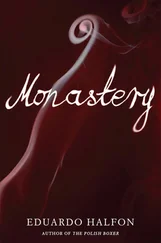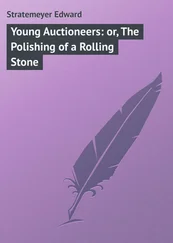Eduardo Halfon - The Polish Boxer
Здесь есть возможность читать онлайн «Eduardo Halfon - The Polish Boxer» весь текст электронной книги совершенно бесплатно (целиком полную версию без сокращений). В некоторых случаях можно слушать аудио, скачать через торрент в формате fb2 и присутствует краткое содержание. Год выпуска: 2012, Издательство: Bellevue Literary Press, Жанр: Современная проза, на английском языке. Описание произведения, (предисловие) а так же отзывы посетителей доступны на портале библиотеки ЛибКат.
- Название:The Polish Boxer
- Автор:
- Издательство:Bellevue Literary Press
- Жанр:
- Год:2012
- ISBN:нет данных
- Рейтинг книги:4 / 5. Голосов: 1
-
Избранное:Добавить в избранное
- Отзывы:
-
Ваша оценка:
- 80
- 1
- 2
- 3
- 4
- 5
The Polish Boxer: краткое содержание, описание и аннотация
Предлагаем к чтению аннотацию, описание, краткое содержание или предисловие (зависит от того, что написал сам автор книги «The Polish Boxer»). Если вы не нашли необходимую информацию о книге — напишите в комментариях, мы постараемся отыскать её.
marks the debut of a major new Latin American voice in English.
The Polish Boxer — читать онлайн бесплатно полную книгу (весь текст) целиком
Ниже представлен текст книги, разбитый по страницам. Система сохранения места последней прочитанной страницы, позволяет с удобством читать онлайн бесплатно книгу «The Polish Boxer», без необходимости каждый раз заново искать на чём Вы остановились. Поставьте закладку, и сможете в любой момент перейти на страницу, на которой закончили чтение.
Интервал:
Закладка:
Eduardo Halfon
The Polish Boxer
I have moved the typewriter into the next room where I can see myself in the mirror as I write.
— HENRY MILLERDistant
I was pacing among them, moving up and down between the rows of desks as if trying to find my way out of a labyrinth. We were reading from a Ricardo Piglia essay. We read about the dual nature of the short story, and it didn’t surprise me, as I looked out, to be met with a sea of faces covered in acne and heartfelt bewilderment. We read that a story always tells two stories. We read that the visible narrative always hides a secret tale. The story’s construction makes something hidden appear artificially, we read, and then I asked them if they’d understood it, any of it, but it was as though I were speaking some Bantu language. Silence. But rashly, undaunted, I stepped further into the labyrinth. Several of them were dozing. Others were doodling. An overly thin girl toyed with her long blond locks, absentmindedly coiling and uncoiling a twist of hair around an index finger. Beside her, a pretty-boy eyed her lasciviously. And from within that vast silence, I heard the drone of tittering and whispering and gum chewing and then, as I did every year, I asked myself if this shit was really worth it.
I don’t know what I was doing trying to teach literature to a horde of college kids who were, for the most part, illiterate. Each fall, they’d register for their first year, still emanating a sort of doleful puppy-dog air. Looking like lost sheep, yet smugly convinced that they weren’t, that they knew everything there was to know, that they possessed the most absolute understanding of the secrets governing the universe. Who cared about literature? Who cared about one more course with one more stupid jackass spouting even more stupid bullshit about books, and oh books are so wonderful, and books are so important, yeah, whatever, dream on, but me, I’m fine with no books and no jackass who still thinks literature matters. They were thinking something like that, I suppose. And I suppose, too, that seeing them sit there year after year with those same self-satisfied expressions, those haughty yet ignorant looks on their faces, I understood them perfectly, and even almost conceded their point, and recognized in them some trace of myself.
It’s like the stars.
I turned around and saw a thin, dark-skinned kid whose fragile features made me think for some reason of a rosebush — not a rosebush in bloom, but a sad, spindly rosebush with not a single rose on it. Several students giggled.
Excuse me?
It’s like the stars, he said again, softly. I asked him his name. Juan Kalel, he replied just as quietly, without looking at me. I asked him to explain what he meant by that, and he sat in silence for a moment, as if ordering his thoughts. Well, stars are stars, he said timidly, and again came the tittering, but I asked him to please continue. I mean, the stars in the sky are the stars that we see, but they’re also something more, something that we can’t see but that’s still there. I said nothing, giving him space, giving him time to elaborate. If we arrange them, they become constellations, he murmured, which represent zodiac signs, which in turn represent each one of us. I replied that was all well and good, but what did it have to do with a story? He was silent again, and while he thought, I sauntered back to the desk where I’d left my milky coffee and took a long, tepid sip. What I mean is, he continued falteringly, as if each word pained him, a story is something we see, something we read, but if we arrange it, it becomes something else too, something we can’t see but that’s still there, between the lines, implicit.
The other students sat in silence, staring at Juan Kalel as though he were a freak, awaiting my reaction. I considered the metaphysical and aesthetic ramifications of his words, the many implications that even Juan Kalel himself probably wasn’t aware of. But I made no comment. Instead, between sips of coffee, I simply smiled at him.
After class, back in the faculty lounge, I poured more coffee into my paper cup, lit a cigarette, and began leafing distractedly through the newspaper. A psychology professor, a woman by the name of Gómez or González or something, sat down beside me and asked what class I was teaching. Literature, I said. Wow, tough, she replied, though I have no idea why. She wore too much makeup and her hair was dyed a weary shade of ocher, the color of a kinkajou or an abandoned doll. The rim of her cup was already kiss-marked red. And what are the kiddies reading? she asked a bit too jovially. She actually called them kiddies. I stared at her with as much solemnity and intolerance as I could muster and, exhaling a cloud of smoke, told her that for now we were doing a few Donald Duck and Pluto stories. Well, she said, and that was all she said.
I spent the next few days thinking about Juan Kalel. I’d managed to find out that he was on a full scholarship, in his first year, and majoring in economics. He was seventeen years old and a native of Tecpán, a beautiful city of artichokes and fir trees in Guatemala’s western altiplano region, though calling it a city might be a bit of a stretch and calling them fir trees might be a bit optimistic. Everything about Juan Kalel was out of sync with the other students in my class and, of course, the whole university. His sensitivity and eloquence. His interest. His appearance and social status.
As is the case at many private Latin American universities, the vast majority of students from Francisco Marroquín University come from wealthy families, or families who think they’re wealthy and therefore also think they’ve got their children’s economic futures all sewn up. As a consequence, their degrees become mere trinkets, awarded to prove that some family custom or other has been followed, and to stifle gossip. In fact, you could easily claim that the disdainful, pedantic attitude you see there is actually more pronounced in the first-year students whom I, with unmistakable fatigue, had to accept into my classes each year. I’m generalizing, and perhaps recklessly, but the world can only be understood through generalizations.
From time to time, however, out of that great mass of falsehood and hypocrisy, there appears (to expand on his metaphor) a shooting star like Juan Kalel, who has vocation and devotion and a passion for all types of learning, which stems from a genuine need and not some pathetic and deplorable sophism, and who, by saying a few words, exposes the falsehood and hypocrisy not just of the other students, but sometimes even of the professor and his stuffy ivory tower.
The first author on the syllabus was Edgar Allan Poe, a logical jumping-off point, I think, given that it was a contemporary short story course. I’d asked them to read two of his stories, “The Purloined Letter” and “The Black Cat,” thereby enabling us to cover his detective stories with one and suspense fiction with the other.
At the beginning of class, a pudgy girl raised her hand and said she hadn’t liked the stories at all. Fine, I said, that’s your right, but tell us why. To which she simply replied, making a disgusted face: Just really gross. A few people laughed; others seconded her opinion. Yeah, really gross. So I explained to them that taste has to be accompanied by a more refined understanding, that most of the time we dislike something simply because we don’t understand it, haven’t really made an effort to understand it, and the easiest response is just to claim we haven’t liked it and wash our hands of the whole affair. You’ve got to develop criteria, I said, exercise your ability to analyze and synthesize, and not just spit out empty opinions. You’ve got to learn to read past the words, I said, rather poetically, I believe, though no doubt all I did was confuse them further. I spent the rest of the period fleshing out the intricacies of both stories, the almost invisible network of symbolism Poe had cast just beneath the surface of each text like a supporting framework. Any questions? I asked after wrapping up. And a boy with long hair asked, as someone does each year, if authors like Poe did that on purpose, like, wove a second story line, a secret narrative into the gaps in the visible one, or if it just came out spontaneously. And as I did every year, I said that you’d have to ask him, but that in my opinion, therein lay the difference between a writer and a great writer: the ability to be saying one thing when in reality you were expressing another, the ability to use language as a means of accessing a sublime, ephemeral metalanguage. Like a ventriloquist? he asked. Yes, I suppose so, I said, although later, when I gave it some more thought, I regretted having said it.
Читать дальшеИнтервал:
Закладка:
Похожие книги на «The Polish Boxer»
Представляем Вашему вниманию похожие книги на «The Polish Boxer» списком для выбора. Мы отобрали схожую по названию и смыслу литературу в надежде предоставить читателям больше вариантов отыскать новые, интересные, ещё непрочитанные произведения.
Обсуждение, отзывы о книге «The Polish Boxer» и просто собственные мнения читателей. Оставьте ваши комментарии, напишите, что Вы думаете о произведении, его смысле или главных героях. Укажите что конкретно понравилось, а что нет, и почему Вы так считаете.












